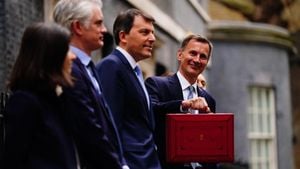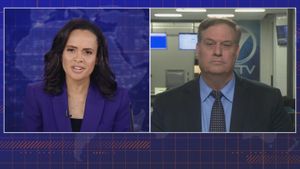With the U.S. presidential election just around the corner, many are left contemplating the potential ramifications of either Kamala Harris or Donald Trump taking office. While both candidates have their supporters and critics, the broader economic impacts of their respective victories are raising eyebrows, sparking debates among economists and investors alike.
Donald Trump, the former president and current Republican nominee, presents policies rooted heavily within his 'America First' doctrine. This campaign slogan, which encapsulates his administrative style, focuses on withdrawal from foreign commitments and promoting U.S. interests. But what does this mean for the economy, both domestically and internationally? Many economists believe this shift could lead to market turmoil, particularly alarming when viewed through the lens of potential tariff hikes.
For those who have been keeping tabs on Trump's proposals, one of the main concerns appears to be his intensive focus on tariffs. During his previous term, Trump did not shy away from discussing the imposition of heavy tariffs on imports, particularly targeting China. Should he reclaim the presidency, analysts fear these tariffs might become more pronounced, potentially leading to trade wars and global supply chain disruptions. The anticipated effect is not limited just to the U.S.; countries dependent on trade with America could also experience downstream economic pressure.
A recent statement from 23 Nobel Prize-winning economists expressing concern over Trump's economic policies echoed this sentiment, warning of higher prices and larger deficits should he return to the Oval Office. They noted how tariffs could not only increase inflation domestically but might also predicate retaliatory measures from other economies, straining international relations and bolstering global inflation.
On the other hand, if Harris wins the presidency, it's speculated the existing policies and economic conditions will largely remain unchanged. According to Moody's chief economist, Mark Zandi, the expectation is for the policy status quo to prevail, meaning no significant fluctuations—economic or otherwise. Harris's approach aims to balance spending, taxation, and regulation with fewer drastic shifts than her opponent. The economists' consensus suggests this stable approach could maintain current inflation rates and interest levels, providing grounded expectations for the economy.
Currently, mortgage rates are already feeling the effects of this uncertainty, with many consumers facing hurdles when searching for housing during this electoral lull. A Trump victory is expected to exacerbate these conditions, as mortgage rates have been influenced by speculation surrounding his potential tariffs and budget deficits. Economists predict rates might push higher, influenced by anticipated inflationary pressures and the fallout from market dynamics. These developments could make housing markets even more rigid, as sellers remain hesitant to trade lower rates for potential newly inflated costs.
What does this mean for international markets? Observers globally are increasingly apprehensive about how American domestic policies could sway not just capital flows but also the broader economic stability of numerous economies. For investors, apprehensions around higher inflation could lead to upticks in U.S. Treasury yields, effectively raising the cost of borrowing and creating instability internationally.
Both Harris and Trump have differing views on immigration, which also carries significant economic weight. Trump's proposals for stricter immigration policies—exemplified by his mass deportation ideas—could limit the labor supply and stunt economic growth, as fewer workers could mean slower earnings for industries heavily reliant on immigrant labor.
The ramifications could resonate even as far as Japan, where investors are currently bracing for any political and economic shifts resulting from the U.S. election. Local economists predict Trump's election might lead to the depreciation of the yen, driven by fears of rising U.S. inflation and potential increases in U.S. interest rates. This atmospheric charge of potential instability over the U.S. election results plays heavily on Japan's investment market, reflecting the interconnectedness of global economies.
At the heart of this discourse is the pivotal question: how can the leadership styles and economic policies of these two candidates shape the world's financial fate and the everyday lives of citizens? Those invested—both literally and metaphorically—are weighing their options carefully. Whether it's through stock market investments, housing decisions, or international business strategies, the impacts of the upcoming election are all but certain to reverberate far beyond American borders.
There's no doubt the upcoming election is not just about one nation's future but the global economy as well—a sobering notion as predictions across the financial spectrum deepen and circumstances evolve.
With studies showing alarming inflationary prospects under Trump, one has to wonder how global leaders would navigate future diplomatic waters should he return to power. Trade agreements, military alliances, and economic collaborations could all hang perilously on his approach to governance and policy execution.
The results of this election could very likely steer numerous economic currents. Whether it's tariffs affecting global trade flows, increased mortgage rates locking citizens out of home ownership, or international markets reeling from changes to the dollar's value, the stakes are high and the impacts far-reaching.
Astute observers know it’s not just the American populace gazing at the ballots—the entire world has its eyes on the U.S., poised to react based on the election's outcome. How will the choices made on Election Day echo through the fabric of the global economy, influencing everyday lives and financial realities? Only time will tell, but one thing is clear: the geopolitical chessboard is being set for significant moves.
What remains to be seen is how these financial predictions will play out. With the economic outlook resting heavily on the election results, one cannot help but feel cautious optimism or trepidation as the curtain rises on what could be one of the most consequential elections yet.



